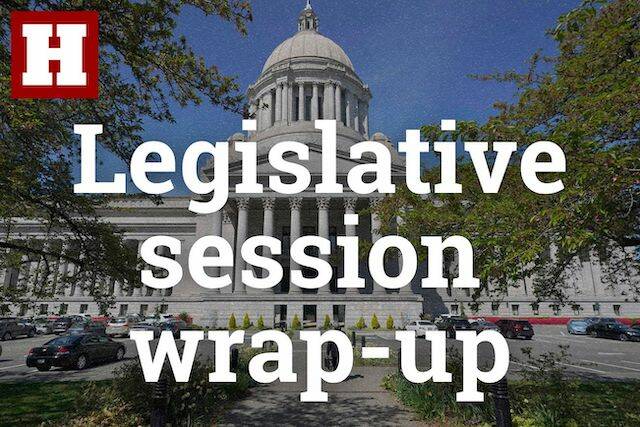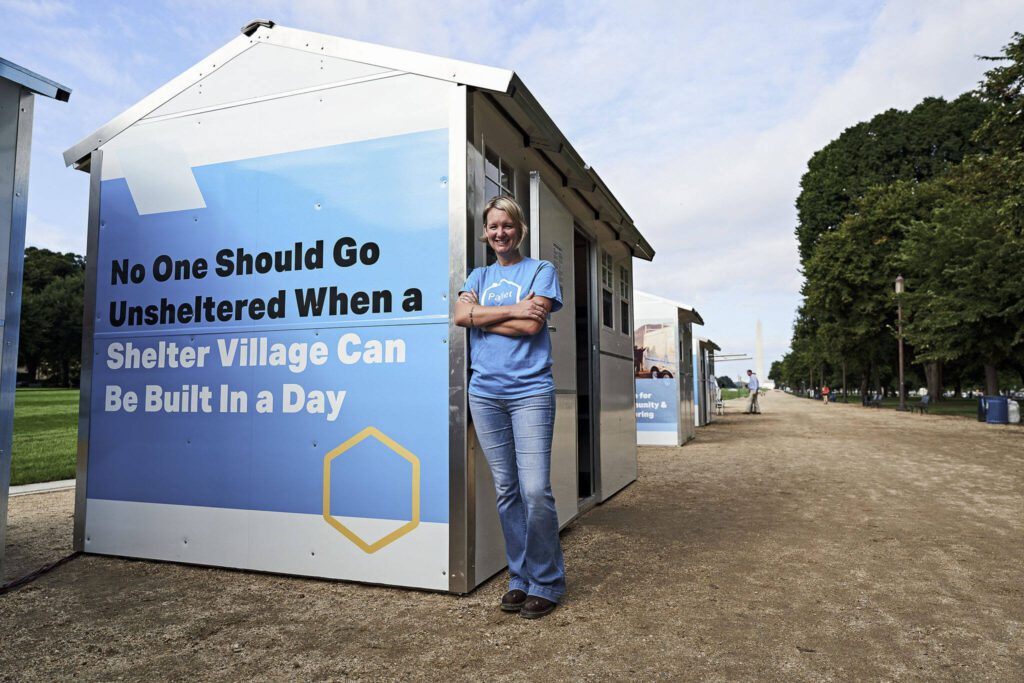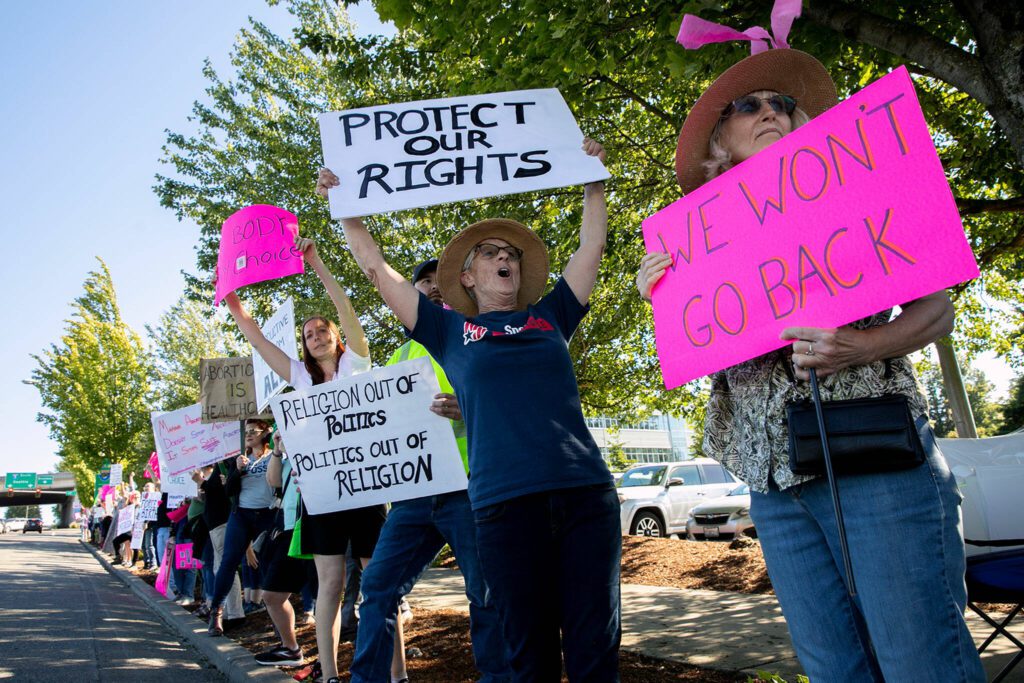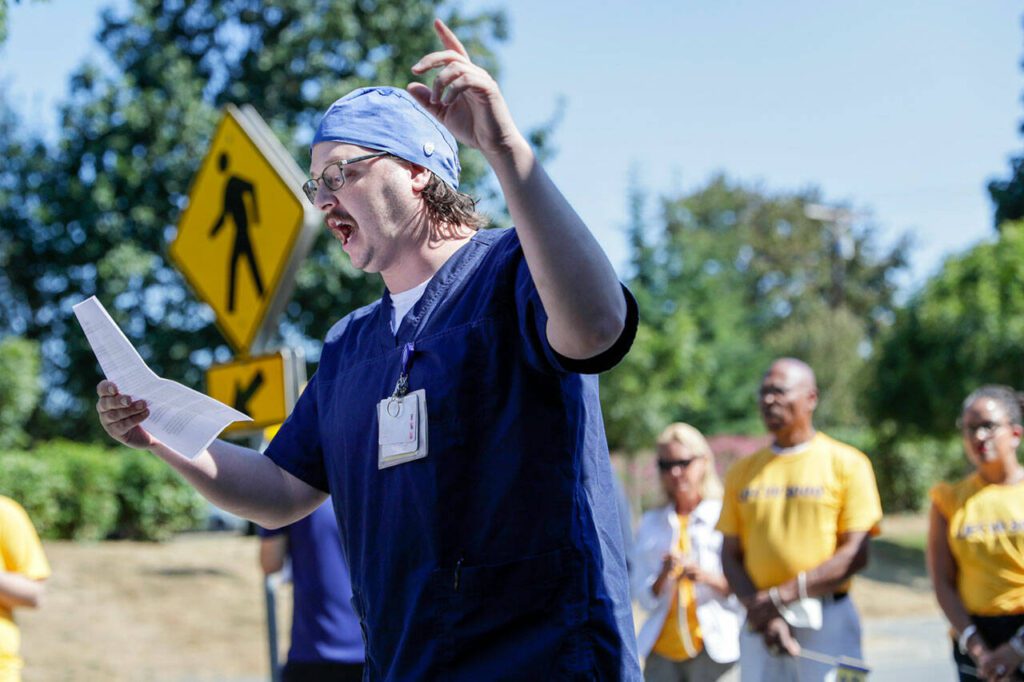OLYMPIA — State lawmakers figured to close out their 2023 session Sunday night by voting to reset Washington’s approach on illegal drug possession. But that didn’t happen.
Instead, a compromise Blake bill sunk under the weight of bipartisan opposition, delivering a chaotic ending to a 105-day session in which protecting individuals’ lives, liberties and pursuits got invoked in many of the year’s legislative debates.
This was the first in-person session in three years. Legislators wasted few moments, passing hundreds of bills for Gov. Jay Inslee to consider signing.
Here are seven things they did — and the one big one they didn’t that could bring them back to Olympia for an emergency special session.
Billions, with a B
Lawmakers had one task to complete this session: approve new operating, capital and transportation budgets. They did. The operating budget gets most of the attention because it will spread $69.8 billion through state agencies and into communities across Washington in the next two years. And at 1,200-plus pages, there’s a lot of spreading around of dough. The capital budget is often the most discussed post-session because it contains earmarks for hundreds of local groups and community projects. For example, there’s millions to help build a new ballpark for the AquaSox and thousands for a new playground in Mays Pond near Mill Creek. You can find who gets what where on this site. And, for the first time, a significant addition to all three of the budget ledgers are a billion dollars in Climate Commitment Act money. These are proceeds from the auction of pollution allowances under the cap-and-trade system. Collectively, it’s the largest investment into the state’s fight against the effects of climate change.
Gimme shelter
Inslee’s clarion call for lawmakers “to go big, so people can go home” got answered. On paper. His bond measure floundered but many other initiatives didn’t. A billion public dollars, in round numbers, will go to build new abodes, keep cash-strapped families in theirs and move homeless from highway encampments into temporary shelter. New permitting rules intend to spur home construction by the private sector. New zoning rules — remember middle housing — aim to increase density on infill lots and in residential neighborhoods of large urban and suburban areas. There are new incentives to make it easier for homeowners to add accessory dwelling units. And a new $100 document recording fee will help some first-time homebuyers with down payment and closing cost assistance.
Safe haven
The day after the overturning of Roe v. Wade last June, Democratic Gov. Jay Inslee and Democratic lawmakers set out to reinforce Washington’s already strong abortion rights protection. And they did. They passed bills eliminating co-pays and deductible requirements for abortion, erasing a potential financial barrier to obtaining reproductive care and services. They strengthened protections against release of private health data. They blocked other states from disciplining doctors and nurses who provide reproductive health services and gender affirming care in line with Washington law. They passed a bill to shield those who come to Washington for reproductive care from punishment in their home state where the procedure may be outlawed. And the state is set to hand out the abortion pill mifepristone, because Inslee ordered the purchase of 30,000 doses, considered enough to cover demand for three years.
A ban arrives, a waiting period grows
Washington will soon become the 10th state to outlaw sales of many models of semiautomatic rifles. Passage of this restriction seemed inevitable in this seventh session of trying by Democrats. They had slightly larger and leftward-leaning caucuses. A procedural issue led to the Senate debating and approving it twice. No Republicans supported it either time. Majority Democrats also passed a bill to extend the waiting period to obtain a newly purchased gun to 10 days, and to require completion of a safety training course before buying a firearm. And a third future law will establish a means for the state or individual to hold firearm makers and dealers legally liable should one of their products end up in the wrong hands and used in the wrong way.
Pursuits
Lawmakers unwound a 2021 policing reform that had curbed use of high speed pursuits. Law enforcement agencies contended the change had led to more brazen behavior by individuals, including fleeing crime scenes. Soon-to-be-signed legislation allows a law enforcement officer to initiate a chase with reasonable suspicion a person in a vehicle has committed or is committing a certain crime. Current law sets a higher threshold of probable cause.
Fewer pink slips?
Lawmakers are touting $2.9 billion in new spending for the K-12 system included in the new budget. They call it the largest investment since the McCleary decision from the state Supreme Court decision a decade ago. We’ll have to wait and see if it means fiscally challenged school districts still proceed with layoffs. There is serious new money for special education which should drive more dollars to districts. In other areas, there is money to create more slots for the Early Childhood Education and Assistance Program. On the policy front, another pathway to graduation is coming. This one for “performance-based learning experience” which could be a project, community service, or cultural activity. And high schoolers could earn a couple elective credits while doing a paid job.
Nurses, we see you
Hospital administrators and nurses engaged in one of the great stare downs of the 2022 session. Nurses wanted the state to set ratios of patients to nurses. Hospitals didn’t. They battled to a draw. This year the two sides reached an agreement that got written into law. Leaders of larger hospitals must sit down with their nursing and health care staff and, in an oversimplification of a complex bill, figure out a ratio and put it into a staffing plan that state agencies can and will enforce. Lawmakers also agreed to have post-traumatic stress disorder classified as an occupational condition for registered nurses who have experienced traumatic events on the job. In a related move, the final budget boosts payments to providers of health and medical care. This should lead to higher pay for home care workers and employees of long-term care facilities, nursing homes, and adult family homes.
What they didn’t do
It took until Day 104 to come up with a way to resolve how Washington will deal with illegal drug possession. It took one night, and one vote, to kick it to the curb. The answer, also known as the Blake Fix, makes the knowing possession and use of a “counterfeit substance” in a public place a gross misdemeanor punishable by up to 364 days in local lock-up, a $5,000 fine if you’re not indigent, or both. But with less than four hours to go in the session, it failed to pass, 43-55 as 15 Democrats joined 40 Republicans in dissent. What’s next? Come July 1, the state law making drug possession a crime goes away. Inslee doesn’t want that to happen. He called on lawmakers to come up with an agreement and he’ll call a special session so they can pass it. Meanwhile, cities and counties can adopt their own drug use laws. They are.
Talk to us
> Give us your news tips.
> Send us a letter to the editor.
> More Herald contact information.
































